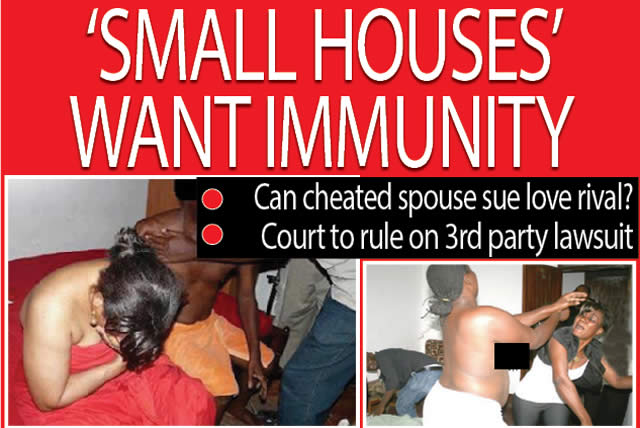‘SMALL HOUSES’ WANT IMMUNITY


Daniel Nemukuyu Harare Bureau—
THE suing of a third party for adultery is unconstitutional because the two people who enter into a marriage are the ones responsible for protecting it, a Harare woman being sued for adultery has argued. Lorraine Matione, a nurse at Harare Central Hospital, is being sued for $25,000 for allegedly having an adulterous affair with Lawrence Muzvondiwa, who was legally married to Georgina Njodzi, resulting in their marriage breaking down.
In her defence in the case which is now before the Harare High Court, Matione argued that she could not be sued since she had no obligation to protect Muzvondiwa’s marriage as the parties to the union were answerable to its demise. The adulterous relationship resulted in the birth of a child and the end of the marriage.
On that basis, Njodzi, through her lawyer Nyasha Munyuru, slapped Matione with a $25,000 adultery suit. She says $15,000 is for damages for contumelia (compensation for an offensive act) and $10,000 for loss of comfort, society and services of the husband. While defending the case, Matione, who is being represented by Wellington Pasipanodya, contested the constitutionality of adultery damages against a third party.
“In essence, the buck stops with the husband and wife who take it upon themselves to enter into a marriage and to make commitments and promises to each other,” she said. “The burden of staying faithful in a relationship and the blame for those who don’t, should be on the couple involved, not any third party they pick up on the side as part of their marital dysfunction.
“A third party, in this instance the defendant, is not party to the marriage between the plaintiff and her spouse and, therefore, the defendant can’t possibly be held liable for the demise of a contract to which she is not the proverbial signatory and which terms she is not even aware of.” Matione argued that the suing of a third party for adultery was unconstitutional.
“It’s submitted that the use of adultery damages as an actionable delict no longer holds any weight when analysed within the context of our constitutional framework,” she said. “The defendant is being sued and yet the chief architect of the relationship, that is the plaintiff’s husband, is not allowed to be cited. Why is there such a differentiation in our law when the Constitution clearly states that all must be treated equally by the law?
“It’s trite that the demise of a marriage cannot be attributed to a third party who is not a party to the marriage contract. It is, therefore, folly for the law to attribute fault where it doesn’t exist.” The lawyers further argued that there was need for the court to satisfy itself that it was indeed Matione who ruined the marriage or that the marriage was already on the rocks when she featured.
“Whether or not there is such a relationship, it is submitted that a plaintiff must prove by clear and convincing evidence that it was the conduct of the defendant that constituted a controlling cause of the injury to a spouse’s consortium interests and that the defendant’s conduct was not just incidental to other causative factors that destroyed or damaged the marriage or conjugal relationship.”
Suing a third party for adultery was a violation of his or her right to privacy, the lawyers said. “The defendant is placed in the invidious position of having to divulge the details of their relationship which, given the existence of the right to privacy in the Constitution, cannot be justified,” Matione said. “One can safely conclude that a claim for adultery damages infringes a third party’s right to privacy. This is so as there is nothing more personal than one’s sexual relations.”
The third party, who is being sued, according to Matione’s papers, will have his or her right to equal treatment before the law infringed upon. “It unnecessarily creates a rift between a married individual and the one who is not married, directly discriminating on the ground of marital status. The adulterous spouse is accorded an advantage, which the defendant does not possess, thereby further infringing on the equality clause.”
Muzvondiwa and Njodzi married in 1996 under the Marriages Act and the marriage still subsists. In 2012, it is alleged Muzvondiwa entered into an adulterous relationship with Matione and a child was born on April 9, 2014. Since then, Muzvondiwa and Matione have been staying together as husband and wife.
A recent judgement of the Supreme Court of South Africa called for the abolition of a law permitting civil litigation for damages for adultery and it generated debate among legal experts in Zimbabwe. The South African court ruled that the law permitting civil damages for adultery was “archaic’ and that “the time for its abolition has come”.
“In the light of the changing morals of our society, the delictual action based on adultery of the innocent spouse has become outdated and can no longer be sustained,” ruled Justice Fritz Brand adding: “The time for its abolition has come.” The ruling means adultery is no longer a legal basis for claiming compensation for harm in South Africa.
The ruling followed an appeal by a man ordered by the South Gauteng High Court to pay R75,000 in damages to another man with whose wife he had an illicit affair. A three-judge panel reversed the High Court decision and abolished the law.










Comments